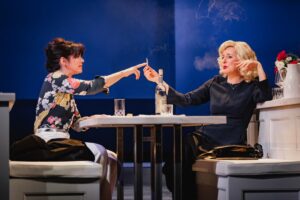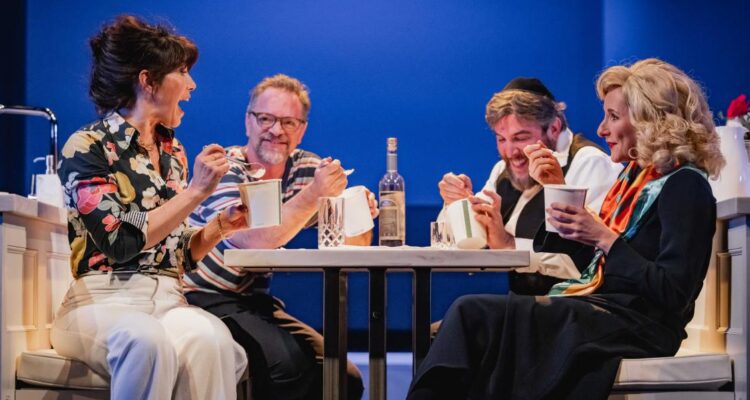Nathan Englander’s What We Talk About When We Talk About Anne Frank attempts to delve into themes of Jewish identity, faith, and the Israeli-Palestinian conflict but falls short of delivering fresh insights. The play revisits debate often aired in public discourse without adding significant depth.
The plot follows Debbie (Caroline Catz) and Phil (Joshua Malina), a secular Jewish couple in Florida, preparing to host Debbie’s childhood friend Shoshana (Dorothea Myer-Bennett) and her ultra-Orthodox husband, Yerucham (Simon Yadoo). Their reunion turns into an ideological clash of secularism versus orthodoxy, liberalism versus tradition, culminating in a “game of honesty.” Along the way, themes of parenting, identity, and politics are touched upon, all intertwined with the characters’ religious views and a casual dalliance with the joys of getting high.

Gabriel Howell’s Trevor, the couple’s student-aged son, injects humor with his playful scene introductions, starting with “Scene One: Facebook.” This stylised touch adds an initial burst of energy, but the play soon loses steam, with the dialogue descending into predictable debates about religion and politics.
While the characters might feel familiar to Jewish audiences, their interactions provide little that would resonate with non-Jews. Exchanges like Shoshana’s comment on Debbie’s attire being inappropriate for Jerusalem come across as contrived rather than provocative. On the political front, Debbie’s blunt statement—“40,000 Palestinians killed in Gaza, it’s genocide…. Oct 7 is a product of years of oppression”—echoes controversial remarks by figures such as UN Secretary-General António Guterres, who attributed recent violence to “years of oppression.” countless attempts to reduce the enormity of the 07 Oct catastrophic impact on Israeli society and the Jewish community. However, these weighty declarations lack the nuance required for a deeper, more thoughtful discussion.
The play takes a brief detour into more amusing territory when Trevor claims to believe in a deity made of spaghetti, referencing Bobby Henderson’s satirical Flying Spaghetti Monster from 2005, a parody intended to mock the arbitrary nature of religious belief. While initially amusing, this concept, like others in the play, isn’t explored beyond a fleeting attempt to shock rather than provoke meaningful reflection.
The tension between the secular and religious couples ebbs and flows, though never reaching its potential. Yerucham’s paternal affection for Trevor, treating him like a misguided but redeemable soul, offers moments of warmth, particularly as Trevor challenges his beliefs with irreverence. However, this contrasts starkly with Yerucham’s uncompromising disapproval of his daughter’s marriage to a non-Jew—another theme introduced but left underdeveloped.
In today’s politically charged climate, where Israel and Jewish identity are constantly scrutinised, the play had the opportunity to provide a timely and nuanced reflection. Unfortunately, it remains stuck in surface-level tropes and clichés. Where other plays, like Oslo, have approached contemporary issues with sophistication and depth, What We Talk About When We Talk About Anne Frank remains confined to well-worn stereotypes.
Patrick Marber’s direction is perhaps the production’s saving grace. His use of stylized movements and wardrobe choices—such as Debbie’s clothing, which exudes both confidence and vulnerability—adds layers to an otherwise thin script. Phil, embodying casual left-leaning intellectualism, is well portrayed but equally underdeveloped.
Despite Marber’s best efforts, the play lacks the sharpness required to fully engage its audience. Its attempts to juggle humor, philosophy, and politics feel muddled, with predictable dialogue overshadowing any genuine intellectual exploration.
Ultimately, while What We Talk About When We Talk About Anne Frank is ambitious in its thematic scope, it falls short of delivering the intellectual or emotional weight its subject matter deserves.
Writer: Nathan Englander
Director: Patrick Marber
Cast: Joshua Malina, Caroline Cates, Dorothea Myer-Bennett, Simon Yadoo, Gabriel Howell.
Until: 23 November 2024
Duration: Running Time: 2 hours (including interval)

